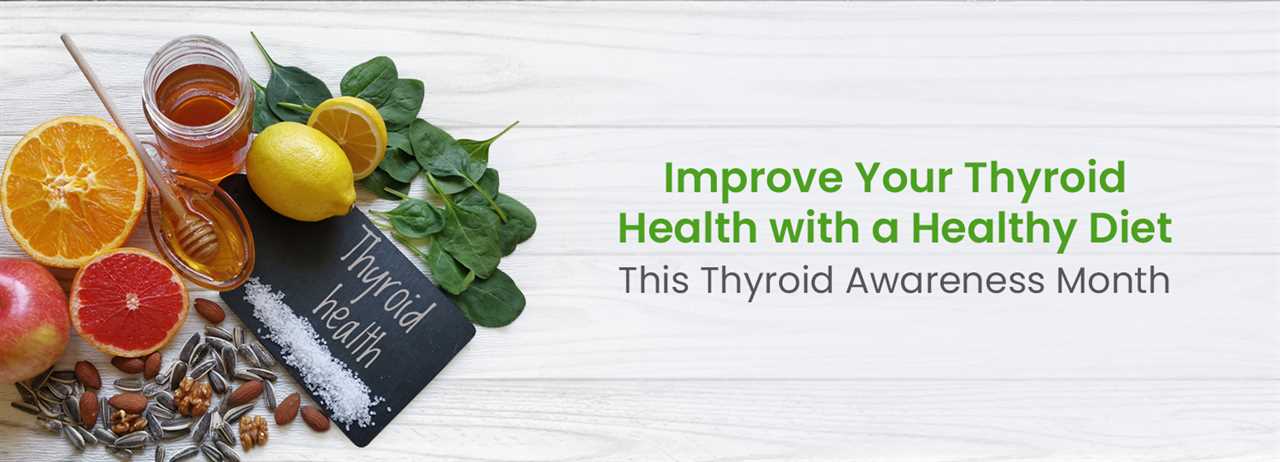
Improve Your Thyroid Health with a Healthy Diet This Thyroid Awareness Month
Several individuals worldwide suffer from thyroid disorders these days. The thyroid is a butterfly-shaped gland that lies at the front of one’s neck. It is one of the crucial glands in our body and secretes thyroid hormones, which play a vital role in maintaining good health. Every year, January is observed as Thyroid Awareness Month to spread awareness about thyroid health issues, their symptoms, and how you can manage them to enjoy good health. The thyroid plays a crucial role in maintaining the good health of our body. It regulates several important body functions, such as breathing, heart rate, muscle strength, cholesterol, body weight, and body temperature. When your thyroid gland’s health is affected, it impacts your overall health. Thyroid disease refers to various conditions that impact how your thyroid gland functions. If the thyroid gland is underactive or overactive, it can cause several health issues. Hypothyroidism and hyperthyroidism are the two most common thyroid diseases that affect numerous individuals worldwide.
Thyroid awareness month aims to educate the masses about thyroid disease conditions and to encourage them to consult healthcare professionals to diagnose whether they suffer from thyroid disease and improve their thyroid health and functions to lead a healthy life. Fortunately, simple but effective dietary modifications can go a long way in improving and maintaining your thyroid health, thereby improving your overall health. So, if you are wondering what are common thyroid conditions that you might suffer from and how diet can help improve your thyroid health, keep reading this blog to discover all about it.
Thyroid Health Issues: Hypothyroidism and Hyperthyroidism
Hypothyroidism and hyperthyroidism are two common causes of thyroid diseases.
-
Hypothyroidism
When your thyroid gland does not secrete a sufficient thyroid-stimulating hormone, the condition is called underactive thyroid or hypothyroidism. Some of the common causes of hypothyroidism are iodine deficiency, autoimmune conditions such as Hashimoto’s disease, thyroid gland surgery, and various radiations. This condition may not be noticeable in the early stages. However, over time, it may disrupt body functions, such as metabolism, heart rate, and body temperature. Dry skin, fatigue, unexplained weight gain, constipation, and cold sensitivity are some prominent symptoms of hypothyroidism.
-
Hyperthyroidism
When your thyroid gland secretes an excess of the thyroid hormone thyroxine, the health condition is called overactive thyroid or hyperthyroidism. Hyperthyroidism may result due to immune system disorders such as Graves’ disease, multinodular goitre, solitary nodule, and excessive exposure to iodine. This thyroid condition can increase the metabolism of your body and cause irregular heartbeat and weight loss.
Symptoms of Hypothyroidism
The common symptoms of an underactive thyroid or hypothyroidism are listed below.
- Fatigue
- Weight gain
- Slow or slurred speech, low voice, or vocal fatigue
- Slowing of movements
- Cold intolerance
- Dryness of hair
- Breathing difficulties
- Constipation
- Reduced capacity to do exercise
- Anaemia
- Hair fall
- Decreased fertility
- High blood pressure
- An increased forgetfulness
- Muscle pain
- Inability to remember things
- Frequent periods or heavy menstrual bleeding
- Erectile dysfunction in men and decreased libido
- Increased risk of abortion in women
Symptoms of Hyperthyroidism
Here’s a list of common symptoms of hyperthyroidism.
- A loss of weight despite increased appetite, because of increased metabolism
- Perspiration
- Anxiety
- A shortness of breath
- Heat intolerance
- Palpitations
- Diarrhoea or excessive defecation
- Hair thinning
- Increased pigmentation
- Swelling that happens to develop in the front of the neck
- Cardiac rhythm disorders
Besides these two common conditions, thyroid cancer is another concerning condition related to the gland. It occurs when the cells grow and multiply abnormally. They form a tumour and may spread throughout the body. The development of a lump in the neck, voice changes, difficulty in swallowing, and swollen lymph glands are some common symptoms of thyroid cancer. Papillary thyroid cancer, follicular thyroid cancer, medullary thyroid cancer, and anaplastic thyroid cancer are some types of cancer related to the thyroid gland.
Diet to Improve Thyroid Health
Adding certain nutritious foods and avoiding some specific foods in your regular diet can help improve and maintain your thyroid health. Let’s have a look at diet for thyroid health.
A. Diet for Managing Hypothyroidism
Hypothyroidism means that your body is not receiving sufficient thyroid hormones. Dietary modifications can help manage this condition effectively. Foods comprising iodine, zinc, and selenium can help in promoting healthy thyroid functions.
Foods to Eat for Managing Hypothyroidism
-
Foods Comprising Iodine
Our body requires iodine to produce thyroid hormones. The deficiency of iodine can lead to an enlarged thyroid gland, which is known as goitre. However, as the body can’t produce iodine, adding it to your diet can help improve thyroid health. So, incorporate foods, such as iodized table salt, milk, cheese, seaweed, saltwater fish, and whole eggs, into your diet. However, take care that you do not consume an excess of iodine. Consulting certified dieticians can help you have the right quantity of iodine in your diet.
-
Foods Rich in Selenium
Selenium has a crucial role in the production of thyroid hormones and aiding antioxidant activity. Thyroid tissues happen to contain selenium naturally. Medical studies reveal that maintaining selenium levels in our body is effective in keeping thyroid disease at bay and improving overall health. So, you may eat shrimp, Brazil nuts, tuna, eggs, brown rice, and oatmeal to elevate your selenium levels and improve your thyroid health.
-
Foods Abundant in Zinc
Individuals having hypothyroidism or low levels of thyroid hormones can find eating foods rich in zinc beneficial. Zinc alone or in combination with selenium helps in improving thyroid functions. So, to manage hypothyroidism, you may include zinc food sources, such as fortified cereals, legumes, yoghurt, pumpkin seeds, and chicken, in your diet.
Foods to Avoid for Managing Hypothyroidism
Certain foods and compounds may interfere with smooth thyroid functions. Avoiding or limiting such foods in your diet for hypothyroidism can help improve your thyroid function.
-
Goitrogens
Goitrogens are compounds that may affect thyroid function if one consumes these compounds in large amounts. So, avoid foods containing goitrogens. However, vegetables containing goitrogens, such as broccoli, are beneficial for overall good health and do not affect thyroid function adversely. Also, cooking vegetables deactivates goitrogenic compounds. Brussels sprouts, collards, broccoli, cabbage, and cauliflower are some of the green cruciferous vegetables containing goitrogens.
-
Soy
Soy interferes with how the body produces thyroid hormones. Curbing your intake of soy can help improve your thyroid health. So, avoid or limit the intake of soy milk, soy sauce, edamame, and tofu.
-
Gluten
Individuals with Hashimoto’s disease, which is a noted cause of hypothyroidism, are more likely to develop celiac disease. Eliminating gluten from your diet helps improve thyroid function in individuals having Hashimoto’s disease who do not have celiac disease. Celiac disease leads to chronic inflammation and damage to the small intestine due to the intake of gluten, which is a protein occurring in the rye, wheat, barley, and oats. The treatment for celiac disease involves following a gluten-free diet. Individuals having autoimmune-related hypothyroidism might go gluten-free to watch whether their relief from the symptoms improves.
-
Processed Foods & Foods having Added Sugar
Reducing the consumption of foods with added sugar and processed foods can help improve relief from hypothyroid-related symptoms, improve your well-being, and manage weight. So, avoid fast foods, doughnuts, cakes, soda, cookies, and other processed foods.
Diet for Managing Hyperthyroidism
Adding some crucial nutrients to your diet can help manage hyperthyroidism naturally. Diet impacts the production of thyroid hormones and thyroid functions. Before moving to look at the foods to eat and foods to avoid when dealing with hyperthyroidism, let’s have a look at some crucial aspects of diet that can impact individuals with hyperthyroidism.
- Iodine is used by the thyroid gland to produce thyroid hormones. However, excess iodine in the diet can increase the production of thyroid hormone, particularly in hyperthyroidism-suffering people.
- Vitamin D and calcium are vital as hyperthyroidism can lead to issues with bone mineral density.
- Consuming beverages and foods comprising caffeine can aggravate the symptoms of hyperthyroidism.
B. Foods to Eat for Managing Hyperthyroidism
-
Foods Low in Iodine
At times, people suffering from hyperthyroidism need to consume a diet low in iodine, particularly if they are going for radiation therapy to remove excess thyroid cells. It may involve eating less than 50 mcg of iodine daily. Foods and beverages low in iodine include non-iodized salt, vegetable oil, spices, herbs, fresh vegetables, fruits, unsalted nuts, nut butter, and lemonade, among others. The guidance of a certified nutritionist can help you receive a suitable diet low in iodine to manage hyperthyroidism.
-
Cruciferous Vegetables
Certain cruciferous vegetables comprise compounds that lower the production of thyroid hormone and reduce the uptake of iodine by the thyroid. So, the intake of these cruciferous vegetables is beneficial for individuals suffering from hyperthyroidism. Cabbage, mustard greens, kale brussels sprouts, radishes, cauliflower, and broccoli are some of these vegetables that can help you beat hyperthyroidism naturally.
-
Foods having Selenium
The deficiency of selenium increases the risk of hyperthyroidism. Selenium is a micronutrient that our body needs for the metabolism of thyroid hormones. Having good levels of selenium in our body can help improve the relief from the symptoms of thyroid conditions, such as thyroid eye disease. Selenium supplementation improves the efficiency of anti-thyroid medicines in people who have them and help them achieve normal thyroid levels soon. Spinach, Brazil nuts, oatmeal, rice, baked beans, and egg whites are some of the food sources of selenium that you may have in your diet. You may avoid cottage cheese, tuna, egg yolk, shrimp, and halibut, as these foods are high in iodine and may affect you adversely when dealing with hyperthyroidism.
-
Iron Food Sources
Iron is a crucial nutrient not only for good haemoglobin levels but also for carrying out normal bodily processes, which include thyroid health. Iron aids the red blood cells to carry oxygen to other body cells. Low levels of iron are linked to hyperthyroidism. So, ensure sufficient intake of iron by adding raisins, spinach, fortified cereals that do not contain ingredients having excess iodine, dark chocolate only with the guidance of a nutritionist, and chicken to your diet. Avoid eating iron food sources that are high in iodine, such as sardines, chickpeas, oysters, fish, lentils, white beans, and kidney beans.
-
Foods having Vitamin D and Calcium
Chronic hyperthyroidism is associated with reduced bone mineral density, which can lead to osteoporosis. Vitamin D and calcium are crucial for good bone health. Broccoli, milk once a day, kale, and fortified orange juice are some of the food sources rich in calcium that you can include in your diet for hyperthyroidism.
Also, several individuals having hyperthyroidism happen to have a deficiency of vitamin D. Spending some time in the morning sunlight can help your body prepare vitamin D all by itself. Also, to boost vitamin D levels in your body, you may have milk, fortified dairy products by checking the labels, fortified cereals, tuna, and sardines. However, while having these foods elevate your vitamin D levels, make sure that you have them in restricted quantity as they are also high in iodine. Ensure that your total iodine consumption is less than 50 mcg daily. The precious guidance of certified dieticians and nutritionists can help you have vitamin D food sources in the right quantities without causing an excess intake of iodine.
-
Spices
Adding certain spices to your diet can help reduce the frequency of thyroid disease, such as hyperthyroidism. So, you may include turmeric and green chillies in your regular diet when dealing with an overactive thyroid. Turmeric also provides you with anti-inflammatory benefits while adding flavour to your food preparations.
Foods to Avoid When Managing Hyperthyroidism
Certain foods can be harmful to individuals having an overactive thyroid when they consume these foods in large quantities. So, when dealing with hyperthyroidism, you need to avoid eating some foods. Here’s a list of foods to avoid when managing hyperthyroidism.
-
Iodine Abundant Foods
Excess of iodine can worsen hyperthyroidism by promoting a lot of secretion of thyroid hormone. So, people having hyperthyroidism should avoid eating foods rich in iodine, such as iodized salt, kelp, shellfish, fish, dairy products, egg yolks, iodine supplements, additives containing iodine, food products with red dye, and baked goods containing iodate dough conditioners.
-
Soy
The intake of soy can interfere with radioactive iodine uptake for hyperthyroidism treatment. So, avoid adding soy to your diet. Avoid the consumption of soy sauce, soybean oil, soy milk, tofu, and edamame beans.
-
Gluten
Autoimmune thyroid disease, which includes Grave’s disease, is more common in individuals having celiac disease than people who don’t have it. Although the reason is not yet clear, genetics is believed to have a role. Celiac disease sufferers are more likely to suffer from autoimmune conditions. They may experience damage to the small intestine due to the consumption of gluten. So, celiac disease sufferers need to follow a gluten-free diet. Moreover, some medical studies recommend that going for a gluten-free diet may help in better absorption of thyroid medication by your intestine and reduce inflammation. So, you may try avoiding gluten when trying to manage hyperthyroidism.
-
Caffeine
The intake of caffeine can aggravate the symptoms of hyperthyroidism, such as insomnia, palpitations, anxiety, and tremors. So, individuals with hyperthyroidism should try to avoid beverages and foods containing caffeine. Avoid having black tea, regular soda, energy drinks, regular coffee, and chocolate.
So, let’s care for our thyroid health this Thyroid Awareness Month by including the right foods in our diet and avoiding eating potentially harmful options. Consulting certified dieticians and nutritionists, such as health experts at Health Total, can help you receive a personalized diet plan for your thyroid health that would suit your thyroid and general condition the best. Our diet for thyroid not only helps promote your thyroid health but also aids in eliminating nutritional deficiencies, boosting immunity, managing weight, and improving your overall health. On top of that, our thyroid diet plan aims at minimizing potential health risks and helping you stay in pink of health naturally. So, hurry up get in touch with us at Health Total, and improve your thyroid health effortlessly with our customized thyroid diet plan.
Sign up for a FREE consultation with Health Total experts to get more tips on improving your thyroid health with diet or for managing any other health condition. Call toll-free at 1-800-843-0206 and book an appointment!
The post Improve Your Thyroid Health with a Healthy Diet This Thyroid Awareness Month appeared first on Health Total.
------------------------------------------
By: techy admin
Title: Improve Your Thyroid Health with a Healthy Diet This Thyroid Awareness Month
Sourced From: www.health-total.com/weight-loss/manage-thyroid-health-issues-with-nutritious-diet-understand-food-to-eat-and-avoid/
Published Date: Fri, 27 Jan 2023 10:32:15 +0000






